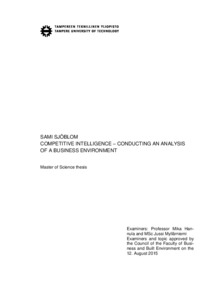Competitive Intelligence – Conducting an Analysis of a Business Environment
Sjöblom, Sami (2015)
Sjöblom, Sami
2015
Tietojohtamisen koulutusohjelma
Talouden ja rakentamisen tiedekunta - Faculty of Business and Built Environment
This publication is copyrighted. You may download, display and print it for Your own personal use. Commercial use is prohibited.
Hyväksymispäivämäärä
2015-12-09
Julkaisun pysyvä osoite on
https://urn.fi/URN:NBN:fi:tty-201511171718
https://urn.fi/URN:NBN:fi:tty-201511171718
Tiivistelmä
This Master of Science thesis is an examination on how does the process of Competitive Intelligence work for as an approach to analyze a fresh, fast-growing and competitive market environment, and through that, for conducting a strategic knowledge product. The empirical part of the work is directed by the interests of the client, Nokia Technologies Oy. The empirical study studies the technology markets considering virtual reality. The research problem is to solve whether a CI based approach works for an analysis of a dynamic and uncertain competitive environment, or not. As a conclusion, the CI works well as a process, being a systematic way to conduct a competitive analysis in a purposeful and manageable manner.
Competitive Intelligence is a term which refers to gathering, analyzing and applying competitive information that is publically, ethically and legally available, into decision-making to gain significant competitive advantages. The CI process enables one to define the key questions regarding a specific issue and answering to them in a way that bases on a strictly defined scope and objective-setting, the identification of information sources, and the selection of relevant methodological choices in terms of analytical tools. The process calls for a commitment and communication from the analyst, and from the decision-makers. The knowledge product will be distributed to the stakeholders in a chosen format, and in the end of the process, the interpretation of the results, conclusions, and the application into practice will take place.
The results suggest that the use of KIT is an appropriate starting point to define a clear framework for the CI process. The process requires a constant monitoring of the emergent business environment, and an on-going information flow to keep the process timely and relevant. Value chain mapping is a slightly heavy technique to analyze the environment, yet it delivers a great platform to map the marketplace at a high level. Scenario analysis enables a flexible way to support strategic planning by enabling a firm to focus on the key factors that might shape the industry. The CI practice is at its best when it is an agile process that has short cycle times with frequent reviews and goal-setting in accordance with the strategic needs.
Competitive Intelligence is a term which refers to gathering, analyzing and applying competitive information that is publically, ethically and legally available, into decision-making to gain significant competitive advantages. The CI process enables one to define the key questions regarding a specific issue and answering to them in a way that bases on a strictly defined scope and objective-setting, the identification of information sources, and the selection of relevant methodological choices in terms of analytical tools. The process calls for a commitment and communication from the analyst, and from the decision-makers. The knowledge product will be distributed to the stakeholders in a chosen format, and in the end of the process, the interpretation of the results, conclusions, and the application into practice will take place.
The results suggest that the use of KIT is an appropriate starting point to define a clear framework for the CI process. The process requires a constant monitoring of the emergent business environment, and an on-going information flow to keep the process timely and relevant. Value chain mapping is a slightly heavy technique to analyze the environment, yet it delivers a great platform to map the marketplace at a high level. Scenario analysis enables a flexible way to support strategic planning by enabling a firm to focus on the key factors that might shape the industry. The CI practice is at its best when it is an agile process that has short cycle times with frequent reviews and goal-setting in accordance with the strategic needs.
